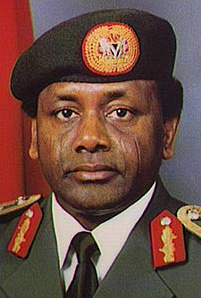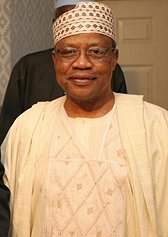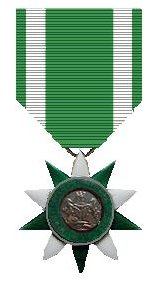
Sani Abacha ; was a Nigerian military dictator and statesman who ruled Nigeria with an iron-fist as military head of state from 1993 following a palace coup d'état until his death in 1998.

The president of Nigeria, officially the president of the Federal Republic of Nigeria, is the head of state and head of government of the Federal Republic of Nigeria. The president directs the executive branch of the Federal Government and is the commander-in-chief of the Nigerian Armed Forces.

Ibrahim Badamasi Babangida is a Nigerian statesman and military dictator who ruled as military president of Nigeria from 1985 when he orchestrated a coup d'état against his military and political arch-rival Muhammadu Buhari, until his resignation in 1993 as a result of the post-12 June 1993 election which he illegally nullified.

Chief Ernest Adegunle Oladeinde Shonekan was a Nigerian lawyer and statesman who served as the interim head of state of Nigeria from 26 August 1993 to 17 November 1993. He was crowned the Abese of Egbaland in 1981.

Babagana Kingibe OV GCON is a Nigerian diplomat, politician and civil servant who has held several high ranking government offices, culminating in his appointment as the Secretary to the Government of the Federation from 2007 to 2008. He spent over a decade in the Foreign Service cadre and has been in politics since the 1970s, serving six heads of state; most recently as a member of the inner circle of President Muhammadu Buhari.

The military dictatorship in Nigeria was a period when members of the Nigerian Armed Forces held power in Nigeria from 1966 to 1999 with an interregnum from 1979 to 1983. The military was able to rise to power often with the tacit support of the elite through coups d'état. Since the country became a republic in 1963, there had been a series of military coups.

The Third Republic was the planned republican government of Nigeria in 1992 which was to be governed by the Third Republican constitution. In the Third Republic, there were democratically elected state governors and state assemblies and a democratically elected federal legislature. The republic was however not fully democratic as there was no democratically elected civilian president. The then military president Ibrahim Babangida's supposed transition eventually turned out to be a ploy to keep executive powers and grant the National Assembly limited legislative powers. Hence all laws passed by the Senate and House of Representatives will have to pass the National Defence and Security Council of Nigeria and finally approved by the President. So while Babangida changed the usual style adopted by preceding military leaders from Head of State to president, he will continue to postpone presidential elections and eventually annul the ultimate one held on 12 June 1993. The Third Republic can thus be described as half military and half civilian.
Donaldson Oladipo Oyeyinka Diya, ; 3 April 1944 – 26 March 2023) was a Nigerian general and lawyer who served as Chief of General Staff under military head of state General Sani Abacha from 1993 until his arrest for treason in 1997. He also served as Chief of Defence Staff and as military governor of Ogun State from January 1984 to August 1985.
Ibrahim Coomassie was a Nigerian police officer and the 9th Inspector General of Nigerian Police serving between 1993 and 1999, under the military governments of Generals Sani Abacha and Abdulsalami Abubakar. He died on Thursday 19 July 2018 after a protracted illness. He was 76 years old.
Abdulkareem Adisa was a Nigerian major general who was military governor of Oyo State during the military regime of General Ibrahim Babangida. He was convicted for involvement in an attempted coup against military head of state General Sani Abacha in 1997, and was on death row when Abacha died in June 1998. He was subsequently pardoned.
Lawan Gwadabe is a Nigerian military officer. He served as Military Administrator of Niger State in Nigeria from December 1987 to January 1992 during the military regime of General Ibrahim Babangida. He was accused of planning a coup against General Sani Abacha in 1995, for which he was jailed, tortured and convicted of treason. After Abacha's death he was granted a state pardon.
Mohammed Chris Alli was a Nigerian Army major general who served as Chief of Army Staff from 1993 to 1994 under General Sani Abacha's regime and was military governor of Plateau State Nigeria from August 1985 to 1986 during the military regime of General Ibrahim Babangida. Many years later, he was appointed interim administrator of the state during a 2004 crisis in the state following ethno-religious killings in Shendam, Yelwa Local Government.

Presidential elections were held in Nigeria on 12 June 1993, the first since the 1983 military coup ended the country's Second Republic. The elections were the outcome of a transitional process to civilian rule spearheaded by the military ruler, Ibrahim Badamasi Babangida. The unofficial result of the election – though not declared by the National Electoral Commission (NEC) – indicated a victory for Moshood Kashimawo Olawale Abiola of the Social Democratic Party (SDP), who defeated Bashir Tofa of the National Republican Convention (NRC). The winner of the election was thus never declared as the elections were annulled by Babangida, citing electoral irregularities. The annulment led to protests and political unrest, including the resignation of Babangida and a weak interim civilian government, and culminated in the continuation of military rule in the country with Sani Abacha ascending to power as the military head of state via a bloodless coup later in the year.
This article is about the particular significance of the year 1994 to Nigeria and its people.
This article is about the particular significance of the year 1992 to Nigeria and its people.

The Order of the Federal Republic (OFR) is one of two orders of merit, established by the Federal Republic of Nigeria in 1963. It is senior to the Order of the Niger.

The Interim National Government was the short-lived civilian administration that governed Nigeria, following the crisis of the Third Republic. The largely powerless and illegitimate government was dissolved when General Sani Abacha seized power on 17 November 1993.

The 1993 Nigerian coup d'état was a bloodless military coup which took place in Nigeria on 17 November 1993 when the Armed Forces, headed by Defence Minister General Sani Abacha, forced Interim President Chief Ernest Shonekan to resign. Shonekan assumed the interim presidency on 26 August 1993, succeeding General Ibrahim Babangida as head of state, in the aftermath of Babangida's annulment of the 12 June 1993 presidential election. In a nationwide broadcast following the coup, Abacha cited the stagnant nature of Shonekan's government, and his inability to manage the democratic process in the country as a cause of his resignation. In September 1994, Abacha issued a decree that placed his government above the jurisdiction of the courts, effectively giving him absolute power. Another decree gave him the right to detain anyone for up to three months.









